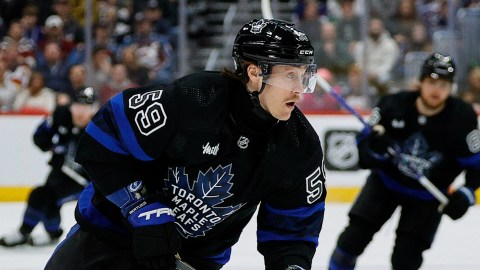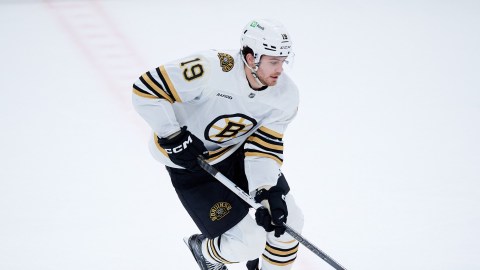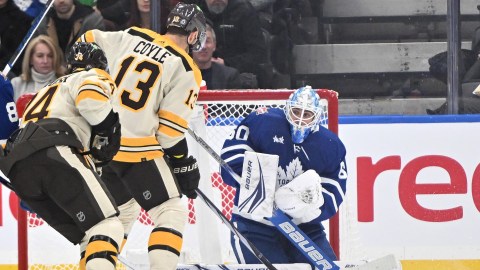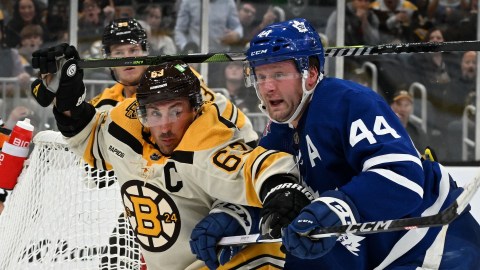The Bruins finally returned home on Tuesday night, and waiting for them was a hungry Ottawa Senators team. The Sens took a much needed win away from TD Garden on the same night that a pair of new Bruins made their debuts.
The league is a week or two from really hitting the stretch run, which gives the B's and their new additions — Brian Rolston, Mike Mottau and Greg Zanon — a chance to get to prove themselves as the playoffs near.
That's where Jack Edwards begins his weekly mailbag.
Jack, Do you think Rolston has enough in the tank to be a factor on the Bruins?
–Alan Ferman via Facebook
For what the Bruins have planned, absolutely. They don't need him to carry the team, they want his skill set to augment what is already there. The Bruins haven't had a left-shot forward who can facilitate flow and shots on the power play since Marc Savard got hurt. Rolston could play anywhere from the point (he still has a bomb of a shot) to the right-side half-boards. He's smart, he doesn't cough up the puck, and he's eager to show that he still can make a contribution at the highest level. He also brings great character into the room which makes him (with Mike Mottau) a really solid pick-up for the cost of two players who probably never would have made it from the ECHL through the AHL to the NHL.
Jack, of the three players picked up at the deadline, who do you believe will have the biggest impact on the B's?
–Dave Pelletier via Facebook
If the Bruins are blessed with good health, probably Rolston. But if someone in the defense corps gets hurt, no doubt the biggest impact player among the three to be acquired will be Greg Zanon. Zanon isn't that big, but he plays large. He's tough as nails (although not a fighter, he isn't shy about playing the body hard), is a shot blocker, and is a smart player. Zanon was originally an Ottawa draft choice (while Peter Chiarelli was assistant general manager there) and did the Blake Wheeler wait-out-your-rights thing, eventually signing with Nashville after four years at the University of Nebraska-Omaha (where he won CCHA honors). Learning to play in the NHL under Barry Trotz? I'll take those guys. I wonder if he can speak glowingly of his Boston experience to Ryan Suter over the summer…
Hi Jack,
I know with the injuries to Horton and Peverley are affecting the team, do you think the scoring chances the Bruins are having are quality shots on net? I mean they're pouring the shots on net but are they routine shots or hard to stop shots? It seems to me that the B's are not crashing the net enough and not putting alot of guys around the net. It reminds lately of their play just passing the puck around the boards like they did a few years ago. To you and Brick: Keep up the great play-by-play. Go Bruins!!
–David M. O'Brien, Holliston, Mass.
It's what commuters hate and coaches love: Traffic. If the Bruins get into "the house" and compete in that most brutal part of the ice, right in front of the goal, the opposing goaltenders won't have as good a view as they got during the 11-11-1 malaise just ended (if, indeed, the St. Louis game was the new beginning).
Patience in the attacking zone is becoming a consistent theme throughout the NHL. Several St. Louis players spoke about Ken Hitchcock's system and this concept: If a forward has the puck in the attacking zone and there isn't a decent-percentage pass available, it's better just to keep possession of the puck, shield it, take the hit, and wait for someone to get open than to throw a hopeful pass into the middle. Why? Because if you have possession, your opponent does not — and by holding it, even in an unthreatening way, 180 feet from where your opponent wants to be, your best defense is a puck-controlling offense. That's a principal reason we see so much sustained possession on the perimeter these days.
That said, teams must come off the half-wall, penetrate and force defensemen to make choices between two bad options — give up the shot or enable the high-percentage pass. Defenses get better-schooled and more compact, it seems, every season. So the "new" space is a forward coming all the way out to the middle of the blue line to try to lure a defender out of position.
Creativity comes from confidence, and confidence grows with success — so there is a chicken-and-egg element to the equation. But whenever and wherever the shots come from, they have to go into an area where the Bruins are depriving the goalie of a good view and ready to compete for a blocked, deflected, or saved shot. It's the thing your funny uncle used to say when you were being a pain in the butt as a kid: "Hey, go play in traffic." Little did we know Unc had such a good hockey mind.
Are the recent struggles of the Bruins a result of the team not sticking to the system, or has the rest of the league discovered a mould on how to beat them?
–Leo McGowan, Narragansett, R.I.
The system works if the players bring their full effort. But that effort isn't just lifting the weight. It is tuning in mentally in a game in which the bodies move at 30 mph, the collisions add up to 50-plus mph and the the puck travels at better than 100 mph. If players aren't completely focused to go all-out all the time, to win every shift, there is far too much parity in the NHL to suggest that any team can just show up and expect to win.
In the last three games leading up to the Bruins' loss to Ottawa on Tuesday (St. Louis, Buffalo and at Ottawa), the B's showed a much better ability to focus and raise their game, answering their opponents' surges with resilience. The rest of the league knows exactly how the Bruins are going to play — it isn't that much of a mystery, especially to the bright minds breaking down the video. But when the Bruins' players execute the system that Claude Julien has designed with their individual and collective talent in mind, they're pretty hard to beat
Hey Jack,
Your rant on Benoit Benoit got pretty famous last year, it was probably his claim to fame before he landed here in the off season, have you two ever talked about that? Or did you just hope he never heard it? You and Andy are great, keep it up.
–Ryan, Wilbraham
Both Brick and I went off on Pouliot, and in retrospect, Pouliot's penalty against Johnny Boychuk might have been the dumbest penalty of the entire 2011 Stanley Cup playoffs. Boston was down two games to going into Game 3 in Montreal. The Bruins led 2-0 late in the first period, but if Montreal scores the next goal, it's a one-goal lead for a team that has to win both Games 3 and 4 in a house of horrors just to give itself a reasonable chance to win the series. Pouliot's penalty didn't result in a power-play goal, but the Bruins scored in the vulnerable minute — actually mere seconds — after Pouliot exited the box. So the next goal was Boston's for 3-0 — instead of Montreal's for 2-1 and a decibel level that would have caused waves in the St. Lawrence River. Pouliot skated one shift the rest of the season — he was scratched in games 4, 5, 6 and 7. The Canadiens haven't recovered since.
To say it was surprising that the Bruins signed him would be an understatement. Pouliot has played well at times but needs to put less predictability into his attacks (using linemates in combination instead of so many low percentage one-on-one stickhandling attempts) and keep up his conscientious back-checking.
We have spoken about last Spring's call, and we'll leave it out of the public. I think Benoit is a nice young man who is still learning the game. Boston would be a good place for him to achieve his potential — there's still a lot of space between his performance and his ceiling.
With the additions Boston added at the deadline, do you think it's enough if Peverly and/or Horton comes back and or both not 100 percent to make a deep post season run?
–Mike, Revere
Possible, yes. Probable, no.
Horton's concussion (still wondering why Tom Sestito walked, regardless of the injury) is a huge X-factor — and the 100 percent component of your question is especially meaningful here because Horton has to clear a neurological hurdle and THEN get game-fit, game-sharp and chase the ghosts of Sestito and Aaron Rome. Not an easy series of events, and not one that anyone should anticipate happening.
While Horton's clutch scoring is a huge factor — and goals are what they count on the scoreboard — Peverley's absence hurts the Bruins all over the place. His quickness keeps defenses on their heels, his decision-making makes life easier for his teammates, and he is out there in every situation: first among Bruins forwards in power play time on ice per game, fourth among Bruins forwards in shorthanded time on ice per game (meaning he's in the top two rotations of penalty-killing forwards).
Peverley's injury, according to the Bruins, is a third degree MCL tear. According to medical definition, that means either a complete tear of the medial collateral ligament in the knee, or a complete disruption of it from the joint. Either way, that's a nasty injury from which to recover in the "four to six weeks" the team expects him to be out. Add to this that Peverley's many skills are all related to his excellent skating ability, and it doesn't seem likely that he will be at 100 percent until after a summer of rest. So, can 90 percent of Rich Peverley be enough to power a deep run? I guess that's why we watch. Nobody knows.
And what if neither is able to return at a high level?
The chance that someone will get magically hot to fill the Horton void is slim — but even that is greater than finding a combination of players to fill all the roles Peverley plays without messing up the forward line rotations. Both players leave holes — yet filling them is the stuff of which sports history is made. This team is deep and determined, and it's the champion until someone knocks the Bruins off.
This is probably one for you and Brick, but what does someone like Shawn Thornton say to his opponents during a face-off that gets them into a fight with him? Because when you watch him he's seems to be kind of nonchalant about it and yet more often than not, he's fighting right after. Thanks and keep being awesome at what you do!
–Mike, Amherst
Thornton is one of the true golden people in this world. He is brutal when he has to be, but he also is enormously respectful of his profession and his opponents. He rarely, if ever, discloses exactly what is said before, during, or after fights, speaking mostly in broad terms such as, "I was pretty sure he knew it was 'go' time." Often we see Thornton and his fellow gladiators acknowledge one another during the pre-game skate with a nod or a fly-by at the red line. We also have seen Thornton stop pounding away if he gets an opponent in a compromised position. But what he says, exactly? We probably won't know until he writes a book after his retirement. I have told him several times that I would be overjoyed to be the ghost writer on that one. His stories certainly will do what great films do: Take us where we never have been and where we never will go — physically, psychically and emotionally.
Good, thoughtful questions again this week. It's great to be home, because the more-reliable technology will enable me to tweet during games @RealJackEdwards. Look for my Boston Bruins Foundation Pan Mass Challenge appeal in the near future — if everyone can just give one dollar to the Jimmy Fund/Dana-Farber Cancer Institute, we can save people's lives! One hundred percent of donated money to the 192-mile two-day Pan Mass Challenge goes directly to DFCI because Pan Mass' administrative and marketing costs are covered by corporate sponsors. Ultimate bang for the buck! I'm riding for the third year with the Bruins Foundation team. We'll see you in the spinning studio and on the roads.



